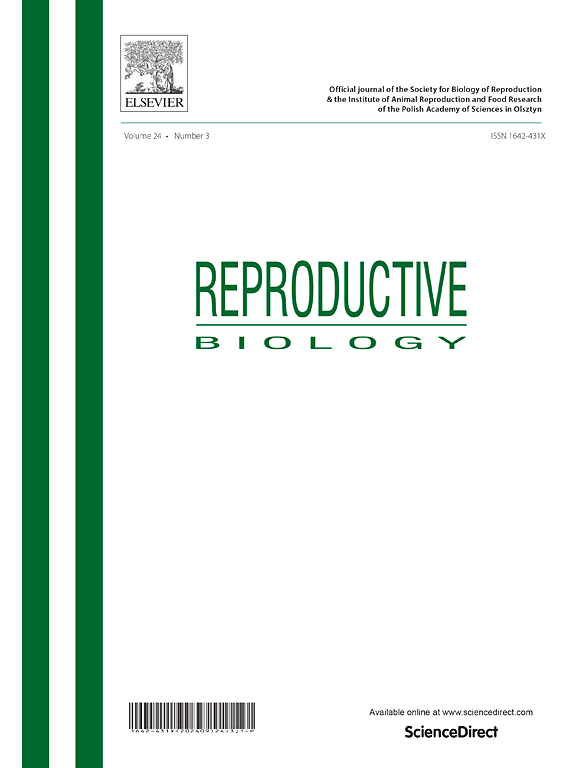Pasteurized Akkermansia muciniphila ameliorates insulin resistance by reducing placental inflammation in GDM mouse model
IF 2.5
3区 生物学
Q3 REPRODUCTIVE BIOLOGY
引用次数: 0
Abstract
Gestational diabetes mellitus (GDM) is a common and serious complication during pregnancy. Depleted next-generation probiotic, Akkermansia muciniphila (AKK) in GDM women indicates its potential on GDM prevention. However, the functions and mechanisms of AKK on GDM remain unclear. Due to the limited strategies for GDM therapy, combined with the anaerobic properties of AKK, herein, we reported pasteurized AKK functions as novel postbiotics which ameliorated glucose intolerance and insulin resistance in the GDM mouse model induced by high-fat diet (HFD) feeding combined with STZ. The oral administration of pasteurized AKK enhanced glucose homeostasis and alleviated placental inflammation in the GDM mouse model. Specifically, placental macrophage polarization was transferred by AKK treatment. In addition, the outer membrane protein of AKK, Amuc_1100, mimicked anti-inflammatory properties and improvement of GDM, which served as an effector protein. These findings demonstrate that oral AKK supplementation alleviated placental inflammatory responses through modulating macrophage polarization. Mechanically, we uncovered that a heat-stable outer membrane protein of AKK, Amuc_1100, mimics the anti-diabetic properties of pasteurized AKK through oral administration. Taken together, our findings demonstrated an effective treatment of GDM from the perspective of potential probiotic agents.
巴氏灭菌的嗜粘阿克曼氏菌通过减少GDM小鼠模型的胎盘炎症改善胰岛素抵抗
妊娠期糖尿病(GDM)是妊娠期常见且严重的并发症。GDM女性中缺失的下一代益生菌AKK (Akkermansia muciniphila, AKK)显示了其预防GDM的潜力。然而,AKK在GDM中的作用和机制尚不清楚。由于GDM治疗策略有限,结合AKK的厌氧特性,本文报道了巴氏杀菌AKK作为一种新型后生物制剂,可以改善高脂肪饮食(HFD)喂养联合STZ诱导的GDM小鼠模型中的葡萄糖耐受不良和胰岛素抵抗。在GDM小鼠模型中,口服巴氏灭菌的AKK可增强葡萄糖稳态并减轻胎盘炎症。具体而言,AKK治疗可转移胎盘巨噬细胞极化。此外,AKK的外膜蛋白Amuc_1100具有模拟抗炎和改善GDM的作用,是一种效应蛋白。这些结果表明,口服AKK补充剂通过调节巨噬细胞极化来减轻胎盘炎症反应。机械地,我们发现AKK的热稳定外膜蛋白Amuc_1100通过口服来模拟巴氏杀菌AKK的抗糖尿病特性。综上所述,我们的研究结果从潜在益生菌制剂的角度证明了GDM的有效治疗。
本文章由计算机程序翻译,如有差异,请以英文原文为准。
求助全文
约1分钟内获得全文
求助全文
来源期刊

Reproductive biology
生物-生殖生物学
CiteScore
3.90
自引率
0.00%
发文量
95
审稿时长
29 days
期刊介绍:
An official journal of the Society for Biology of Reproduction and the Institute of Animal Reproduction and Food Research of Polish Academy of Sciences in Olsztyn, Poland.
Reproductive Biology is an international, peer-reviewed journal covering all aspects of reproduction in vertebrates. The journal invites original research papers, short communications, review articles and commentaries dealing with reproductive physiology, endocrinology, immunology, molecular and cellular biology, receptor studies, animal breeding as well as andrology, embryology, infertility, assisted reproduction and contraception. Papers from both basic and clinical research will be considered.
 求助内容:
求助内容: 应助结果提醒方式:
应助结果提醒方式:


